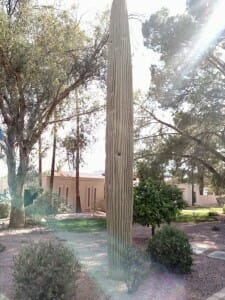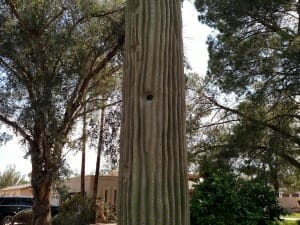Town That Installed Surveillance Cameras All Over the Place Suddenly Concerned with Privacy?
As background, I live in a town called Paradise Valley, Arizona. This town is perhaps most famous recently for installing surveillance cameras all over town hidden in fake cacti. Here is the one on my block. There are at least two others within walking distance of my house.


These cameras apparently have license plate reading ability and perhaps the ability to do facial recognition, and likely are funded by Homeland Security for the purposes of feeding data into a national tracking database. I say "likely" because the town of Paradise Valley under Mayor Michael Collins somehow appropriated these things secretly without any public discussion or debate.
So in this context, it was hilarious to see none other than Mayor Michael Collins piously intoning about the importance of privacy in the town of Paradise Valley:
Paradise Valley is considering an ordinance that would make it illegal to fly drones in town without a permit. Backyard hobbyists and law-enforcement agencies that may need to use drones during emergencies would be excluded from the proposed ban.
"Our residents move to Paradise Valley because they like the privacy," said Mayor Michael Collins, who presides over a community that counts celebrities, sports stars and Discount Tire founder Bruce Halle, the richest person in Arizona, among its residents.
What Mr. Collins apparently means is that he wants the government to maintain a monopoly on surveillance technologies. Libertarians like myself cringe at the notion that a monopoly on privacy-invasion should be granted to the government, the only institution in the country that can legally jail you, take your money, and even shoot you. Conservatives, who dominate this community, tend to be blind to this danger, saying that "if you aren't doing anything illegal, you have nothing to fear from surveillance." I will say, though, that some Conservatives have woken up a bit over the last several years on this with the IRS non-profit harassment and the Wisconsin John Doe investigations.
By the way, extra credit to the Arizona Republic for gratuitously publishing where a wealthy citizen lives in a sentence about privacy.

